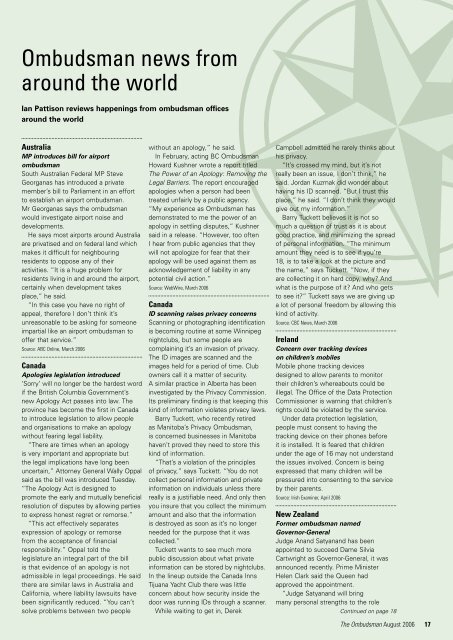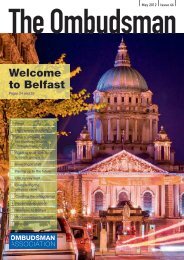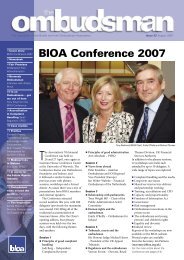29 Ombudsman.indd - British and Irish Ombudsman Association
29 Ombudsman.indd - British and Irish Ombudsman Association
29 Ombudsman.indd - British and Irish Ombudsman Association
You also want an ePaper? Increase the reach of your titles
YUMPU automatically turns print PDFs into web optimized ePapers that Google loves.
<strong>Ombudsman</strong> news from<br />
around the world<br />
Ian Pattison reviews happenings from ombudsman offices<br />
around the world<br />
Australia<br />
MP introduces bill for airport<br />
ombudsman<br />
South Australian Federal MP Steve<br />
Georganas has introduced a private<br />
member’s bill to Parliament in an effort<br />
to establish an airport ombudsman.<br />
Mr Georganas says the ombudsman<br />
would investigate airport noise <strong>and</strong><br />
developments.<br />
He says most airports around Australia<br />
are privatised <strong>and</strong> on federal l<strong>and</strong> which<br />
makes it difficult for neighbouring<br />
residents to oppose any of their<br />
activities. “It is a huge problem for<br />
residents living in <strong>and</strong> around the airport,<br />
certainly when development takes<br />
place,” he said.<br />
“In this case you have no right of<br />
appeal, therefore I don’t think it’s<br />
unreasonable to be asking for someone<br />
impartial like an airport ombudsman to<br />
offer that service.”<br />
Source: ABC Online, March 2006<br />
Canada<br />
Apologies legislation introduced<br />
‘Sorry’ will no longer be the hardest word<br />
if the <strong>British</strong> Columbia Government’s<br />
new Apology Act passes into law. The<br />
province has become the first in Canada<br />
to introduce legislation to allow people<br />
<strong>and</strong> organisations to make an apology<br />
without fearing legal liability.<br />
“There are times when an apology<br />
is very important <strong>and</strong> appropriate but<br />
the legal implications have long been<br />
uncertain,” Attorney General Wally Oppal<br />
said as the bill was introduced Tuesday.<br />
“The Apology Act is designed to<br />
promote the early <strong>and</strong> mutually beneficial<br />
resolution of disputes by allowing parties<br />
to express honest regret or remorse.”<br />
“This act effectively separates<br />
expression of apology or remorse<br />
from the acceptance of financial<br />
responsibility.” Oppal told the<br />
legislature an integral part of the bill<br />
is that evidence of an apology is not<br />
admissible in legal proceedings. He said<br />
there are similar laws in Australia <strong>and</strong><br />
California, where liability lawsuits have<br />
been significantly reduced. “You can’t<br />
solve problems between two people<br />
without an apology,” he said.<br />
In February, acting BC <strong>Ombudsman</strong><br />
Howard Kushner wrote a report titled<br />
The Power of an Apology: Removing the<br />
Legal Barriers. The report encouraged<br />
apologies when a person had been<br />
treated unfairly by a public agency.<br />
“My experience as <strong>Ombudsman</strong> has<br />
demonstrated to me the power of an<br />
apology in settling disputes,” Kushner<br />
said in a release. “However, too often<br />
I hear from public agencies that they<br />
will not apologize for fear that their<br />
apology will be used against them as<br />
acknowledgement of liability in any<br />
potential civil action.”<br />
Source: WebWire, March 2006<br />
Canada<br />
ID scanning raises privacy concerns<br />
Scanning or photographing identification<br />
is becoming routine at some Winnipeg<br />
nightclubs, but some people are<br />
complaining it’s an invasion of privacy.<br />
The ID images are scanned <strong>and</strong> the<br />
images held for a period of time. Club<br />
owners call it a matter of security.<br />
A similar practice in Alberta has been<br />
investigated by the Privacy Commission.<br />
Its preliminary finding is that keeping this<br />
kind of information violates privacy laws.<br />
Barry Tuckett, who recently retired<br />
as Manitoba’s Privacy <strong>Ombudsman</strong>,<br />
is concerned businesses in Manitoba<br />
haven’t proved they need to store this<br />
kind of information.<br />
“That’s a violation of the principles<br />
of privacy,” says Tuckett. “You do not<br />
collect personal information <strong>and</strong> private<br />
information on individuals unless there<br />
really is a justifiable need. And only then<br />
you insure that you collect the minimum<br />
amount <strong>and</strong> also that the information<br />
is destroyed as soon as it’s no longer<br />
needed for the purpose that it was<br />
collected.”<br />
Tuckett wants to see much more<br />
public discussion about what private<br />
information can be stored by nightclubs.<br />
In the lineup outside the Canada Inns<br />
Tijuana Yacht Club there was little<br />
concern about how security inside the<br />
door was running IDs through a scanner.<br />
While waiting to get in, Derek<br />
Campbell admitted he rarely thinks about<br />
his privacy.<br />
“It’s crossed my mind, but it’s not<br />
really been an issue, I don’t think,” he<br />
said. Jordan Kuzmak did wonder about<br />
having his ID scanned. “But I trust this<br />
place,” he said. “I don’t think they would<br />
give out my information.”<br />
Barry Tuckett believes it is not so<br />
much a question of trust as it is about<br />
good practice, <strong>and</strong> minimizing the spread<br />
of personal information. “The minimum<br />
amount they need is to see if you’re<br />
18, is to take a look at the picture <strong>and</strong><br />
the name,” says Tuckett. “Now, if they<br />
are collecting it on hard copy, why? And<br />
what is the purpose of it? And who gets<br />
to see it?” Tuckett says we are giving up<br />
a lot of personal freedom by allowing this<br />
kind of activity.<br />
Source: CBC News, March 2006<br />
Irel<strong>and</strong><br />
Concern over tracking devices<br />
on children’s mobiles<br />
Mobile phone tracking devices<br />
designed to allow parents to monitor<br />
their children’s whereabouts could be<br />
illegal. The Office of the Data Protection<br />
Commissioner is warning that children’s<br />
rights could be violated by the service.<br />
Under data protection legislation,<br />
people must consent to having the<br />
tracking device on their phones before<br />
it is installed. It is feared that children<br />
under the age of 16 may not underst<strong>and</strong><br />
the issues involved. Concern is being<br />
expressed that many children will be<br />
pressured into consenting to the service<br />
by their parents.<br />
Source: <strong>Irish</strong> Examiner, April 2006<br />
New Zeal<strong>and</strong><br />
Former ombudsman named<br />
Governor-General<br />
Judge An<strong>and</strong> Satyan<strong>and</strong> has been<br />
appointed to succeed Dame Silvia<br />
Cartwright as Governor-General, it was<br />
announced recently. Prime Minister<br />
Helen Clark said the Queen had<br />
approved the appointment.<br />
“Judge Satyan<strong>and</strong> will bring<br />
many personal strengths to the role<br />
Continued on page 18<br />
The <strong>Ombudsman</strong> August 2006 17





